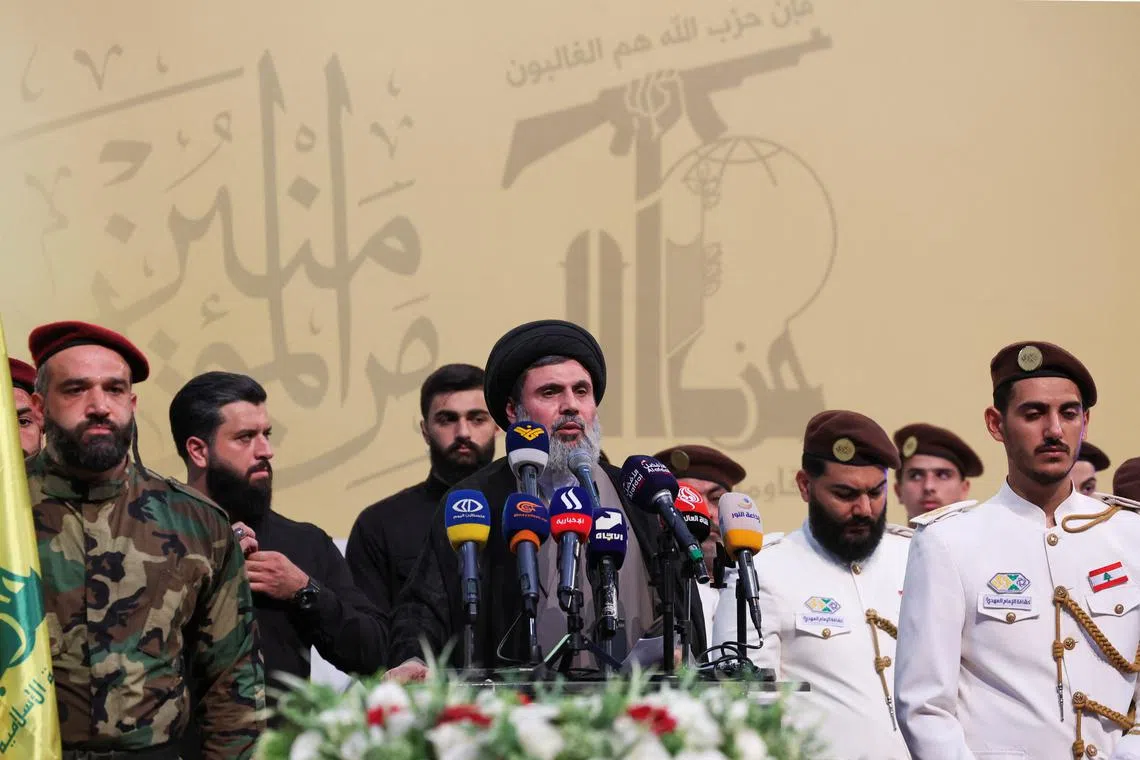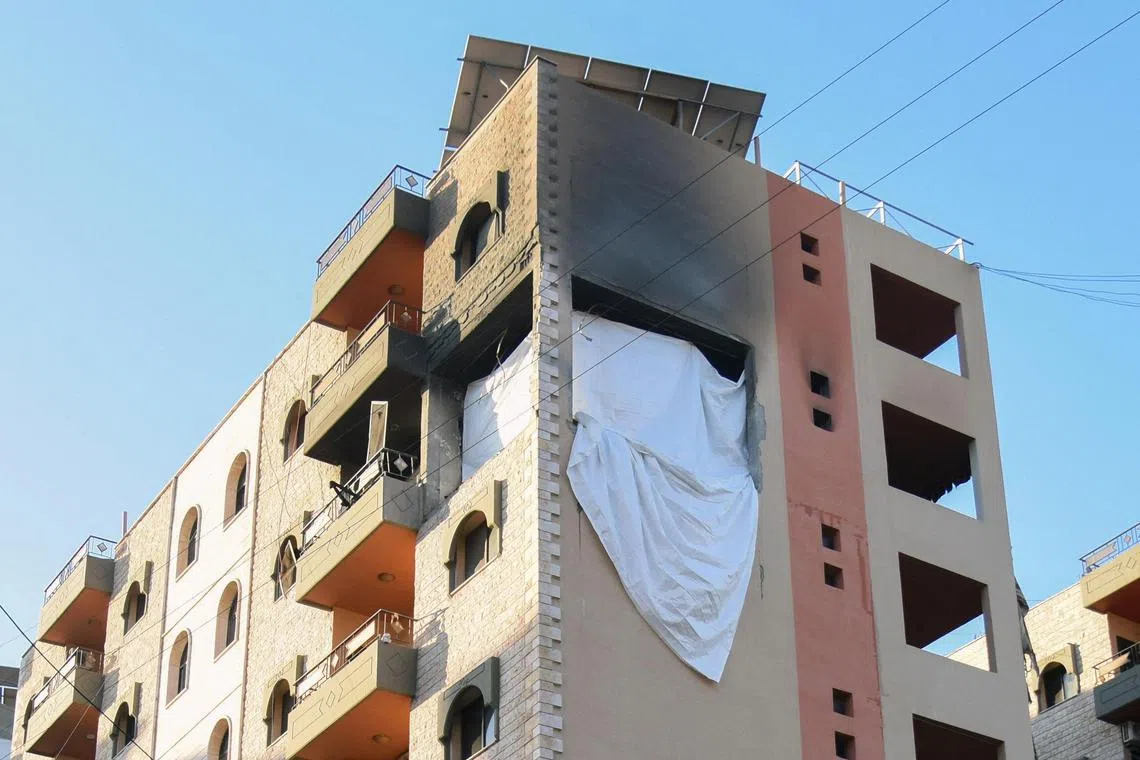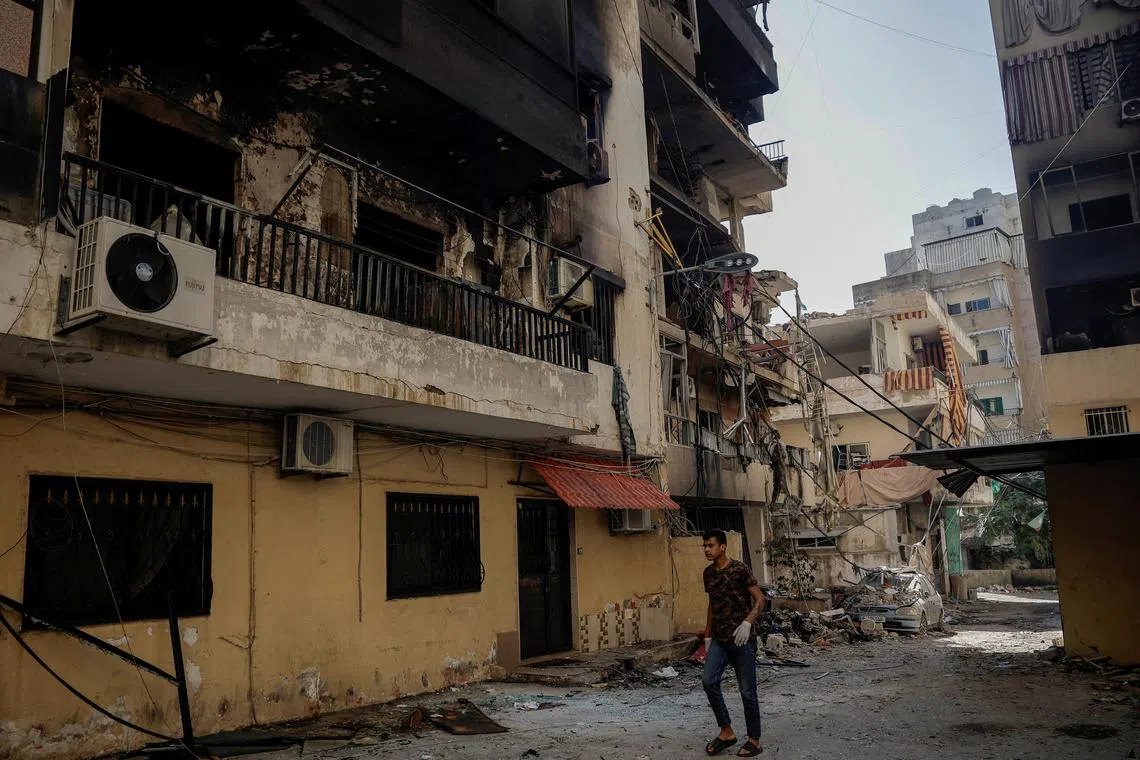Potential Hezbollah leader out of contact after Israeli strike, Lebanese source says
Sign up now: Get ST's newsletters delivered to your inbox

Senior Hezbollah official Hashem Safieddine is widely touted to be the militant group’s next leader, following the death of Sayyed Hassan Nasrallah.
PHOTO: REUTERS
Follow topic:
BEIRUT/JERUSALEM - The potential successor to slain Hezbollah leader Sayyed Hassan Nasrallah has been out of contact since Oct 4, a Lebanese security source said on Oct 5, after an Israeli air strike that is reported to have targeted him.
In its campaign against the Iran-backed Lebanese group, Israel carried out a large strike on Beirut’s southern suburbs late on Oct 3 that Axios cited three Israeli officials as saying targeted Hashem Safieddine
The Lebanese security source and two other Lebanese security sources said that Israeli strikes since Oct 4 on Dahiyeh, a residential suburb and Hezbollah stronghold in southern Beirut, have kept rescue workers from scouring the site of the attack.
Hezbollah has made no comment so far on Safieddine since the attack.
Israeli Lieutenant-Colonel Nadav Shoshani said on Oct 4 the military was still assessing the Oct 3 night-time air strikes, which he said targeted Hezbollah’s intelligence headquarters.
The loss of Nasrallah’s rumoured successor would be yet another blow to Hezbollah and its patron Iran. Israeli strikes across the region in the past year, sharply accelerated in the past few weeks, have decimated Hezbollah’s leadership.
Israel expanded its conflict in Lebanon on Oct 5 with its first strike in the northern city of Tripoli, a Lebanese security official said, after more bombs hit Beirut suburbs and Israeli troops launched raids in the south.
Israel has begun an intense bombing campaign in Lebanon
Israeli military spokesman Daniel Hagari said Israel had killed 440 Hezbollah fighters in its ground operations in southern Lebanon and destroyed 2,000 Hezbollah targets. Hezbollah has not released any death tolls.
Israel says it aims to allow the safe return of tens of thousands of citizens to their homes in northern Israel, bombarded by Hezbollah since Oct 8, 2023.
The Israeli attacks have eliminated much of Hezbollah’s senior military leadership, including Nasrallah, in an air attack on Sept 27.
The Israeli assault has also killed hundreds of ordinary Lebanese, including rescue workers, Lebanese officials say, and forced 1.2 million people – almost a quarter of the population – to flee their homes.
Lebanon’s Health Ministry said on Oct 5 that Israeli strikes had killed at least 25 people and wounded 127 others the day before.
The Lebanese security official told Reuters that an Oct 5 strike on a Palestinian refugee camp in Tripoli killed a member of Hamas, his wife and two children. Media affiliated with the Palestinian group said the strike killed a leader of its armed wing, naming him as Saeed Atallah.
The Israeli military did not immediately comment on the strike on Tripoli, a Sunni Muslim-majority port city that its warplanes also targeted during a 2006 war with Hezbollah.
It said in a later statement that it had killed two Hamas members operating in Lebanon, but did not say where they were killed. There was no immediate comment from Hamas.

A building in Tripoli hit by an Israeli air strike that is believed to have killed a member of Hamas, his wife and two children.
PHOTO: REUTERS
Israel has, meanwhile, staged nightly bombardment of Dahiyeh, once a bustling and densely populated area of Beirut and a stronghold for Hezbollah.
On Oct 5, smoke billowed over Dahiyeh, large parts of which have been reduced to rubble sending residents fleeing to other parts of Beirut or of Lebanon.
In northern Israel, air raid sirens sent people running for their shelters amid rocket fire from Lebanon.
Hezbollah said it had fired missiles at what it called “ATA company for military industries near Sakhnin base”, close to the city of Haifa with a salvo of rockets. It was not immediately clear what Hezbollah was referring to.
The Israeli army could not immediately be reached for comment but said that two projectiles had crossed over from Lebanon, one of which was intercepted while the other landed but caused no damage.

A man walking past a building damaged by Israeli air strikes, in the Chiyah area of Dahiyeh, in Lebanon’s capital, Beirut, on Oct 5.
PHOTO: REUTERS
Israel weighs options for Iran
The violence comes as the anniversary approaches of Hamas’ attack on southern Israel
Israel’s subsequent assault on Gaza has killed nearly 42,000 Palestinians,
Iran, which backs both Hezbollah and Hamas, and which has lost key commanders of its elite Revolutionary Guards Corps to Israeli air strikes in Syria in 2024, launched a salvo of ballistic missiles at Israel
Israel has been weighing options in its response to Iran’s attack.
Rear-Admiral Hagari confirmed in a broadcast statement that two Israeli airbases were hit on Oct 1 but remained operational.
“The way in which we respond to this disgraceful attack will be in the manner, at the location and the timing which we decide, according to the political leadership’s instructions,” Rear-Adm Hagari said.
Israeli Prime Minister Benjamin Netanyahu said in a pre-recorded video message that no country would accept an attack on its citizens like Iran’s on Israel.
“Israel has the obligation and the right to defend itself and to retaliate against these attacks and that is what we will do,” Mr Netanyahu said.
Oil prices have risen on the possibility of an Israeli attack on Iranian oil facilities.
US President Joe Biden on Oct 4 urged Israel to consider alternatives to striking Iranian oil fields,
Israeli media reported on Oct 5 that the top US general for the Middle East, General Michael Kurilla, had landed in Israel.
Israeli and US officials were not immediately reachable for comment. REUTERS

